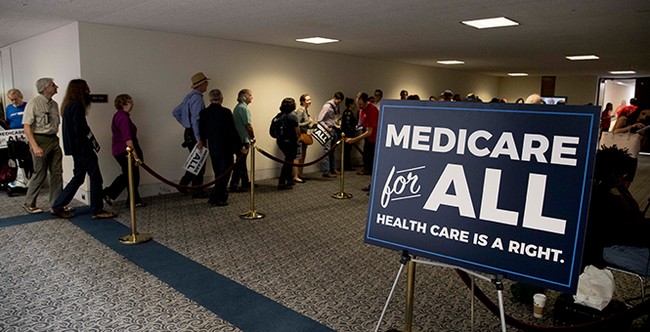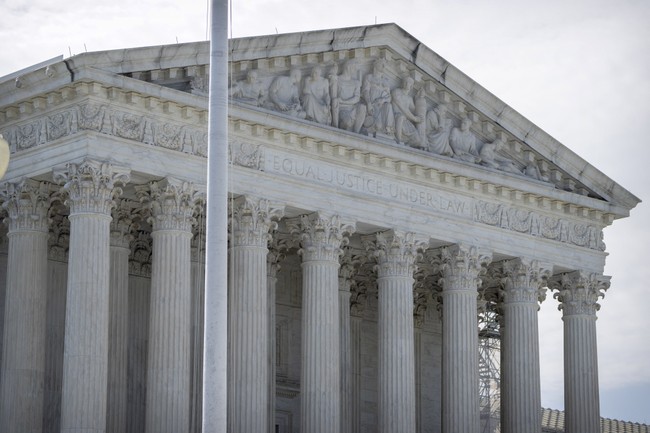What does Kamala Harris actually believe? I don’t think anyone knows for certain but looking back over her run for president in 2019, it is striking how committed she seemed to be to Medicare for All at the time.
And yet, she also had significant trouble defending the plan, not just once but multiple times. She famously raised her hand, along with Bernie Sanders, when asked during a debate who would give up private insurance for Medicare for All. But the next day she was walking it back, claiming she was talking about her personal insurance…or something.
All of this is still very relevant because Harris has now abandoned Medicare for All, but it’s still likely questions about her shifting position will come up during tonight’s debate. In advance of that debate the Harris camp is doing its best, with the help of friendly media, to square the circle between what she was saying then and what she is saying now.
The Harris campaign and her White House office acknowledged that Harris’s health-care positions have shifted since her last bid for the presidency. In interviews, officials said her previous support for Medicare-for-all and current pledge to build on private health insurance draw from a core conviction to expand health coverage and access to services.
Aides and outside advisers said Harris learned key lessons from her experience supporting — and retreating from — Medicare-for-all, such as reckoning with the nation’s complicated health system and the best way to make changes to it.
Just look how hard the Washington Post is working to make her past position something that happened a long time ago and far, far away.
Harris’s allies say that her Medicare-for-all plan — to paraphrase their candidate — didn’t just fall out of a coconut tree. The 2019 proposal needs to be understood in the context of all that came before it.
First came a memorable town hall in August 2017 — more than 2,500 days ago, and more than 2,500 miles away from Tuesday’s debate stage — where the freshman senator made a promise that would help shape her first presidential campaign.
There were two big problems with Medicare for All, one political and one practical. The political problem was that it would end private insurance, meaning everyone would lose the insurance they currently have. That was always unpopular. Harris did her best to talk around this problem in 2019, but she wasn’t very convincing (see the videos below).
The other problem is practical. The cost of any Medicare for All program would be tens of trillions of dollars over 10 years. An estimate of the cost of Harris’ 2019 plan produced last month put the cost in the realm of $44 trillion over a decade.
H&E projects that the insurance coverage expansion under the Plan has a net budgetary impact of -$43.9 trillion dollars over the next decade…
Over the decade spanning between 2026 and 2035, H&E estimates that non-elderly coverage provisions under the proposal will cost $45.4 trillion. The yearly cost is expected to begin at around $4.3 trillion in 2028 (with full implementation) and increase to $5.9 trillion in 2035. This is prior to accounting for administrative savings to the federal government of $2.6 trillion over 10 years. These savings would come from the elimination of federal personnel and contractors required to operate health benefits for Medicaid, SCHIP, TriCare and other federally financed health insurance programs.
At the time, Harris tried to claim there were ways to cover those costs, though she never spelled out what those were. The story her aides are telling the Post now is that she learned from those mistakes.
“She certainly learned over the three and a half years here, the importance of incremental progress,” said Kristine Lucius, Harris’s domestic policy adviser in the White House…
None of this is believable. Harris wanted to swing for the fences on health policy in 2017 and continued to do so in 2019. What she learned is that she couldn’t defend the policy in interviews. It was too expensive and too big a change for most people. So now she claims to be an incrementalist, one content to make small changes to the current system.
But I don’t know why anyone would believe her current, much more moderate position given her history of flip-flops. It’s also pretty revealing that she isn’t saying this herself in interviews. Instead she’s having her staff do it for her. This is supposedly about her changing her mind. Why can’t she explain that in her own words?
To wrap this up, here are two clips from 2019. The first was put together by Justice Democrats who were mocking Harris for botching her pitch for Medicare for All/single payer.
Lastly, here’s an interview she did with CNN in 2019 where it seems pretty clear what her beliefs were about this issue at the time. She talks like a true believer, though her claim that we can afford this seems pretty shaky: “There are ways to pay for it.” Has any of this really changed? Was she lying then or is she lying now? Getting back to where we started, I don’t think anyone really knows.
Update: One more clip from 2019. Here’s Harris saying she is in favor of extending Medicare for All to non-citizens.
Read the full article here




![Kamala Scrambling And Democrats Are Nervous About The Debate With Trump [WATCH] Kamala Scrambling And Democrats Are Nervous About The Debate With Trump [WATCH]](https://www.lifezette.com/wp-content/uploads/2024/08/2024.08.13-08.40-lifezette-66bbc4a73d4c8.jpg)


![Biden’s Push Against Women’s Sports and Biology Blocked by Court [WATCH] Biden’s Push Against Women’s Sports and Biology Blocked by Court [WATCH]](https://www.lifezette.com/wp-content/uploads/2025/01/2025.01.10-02.15-lifezette-67812b6a6a461.jpg)

